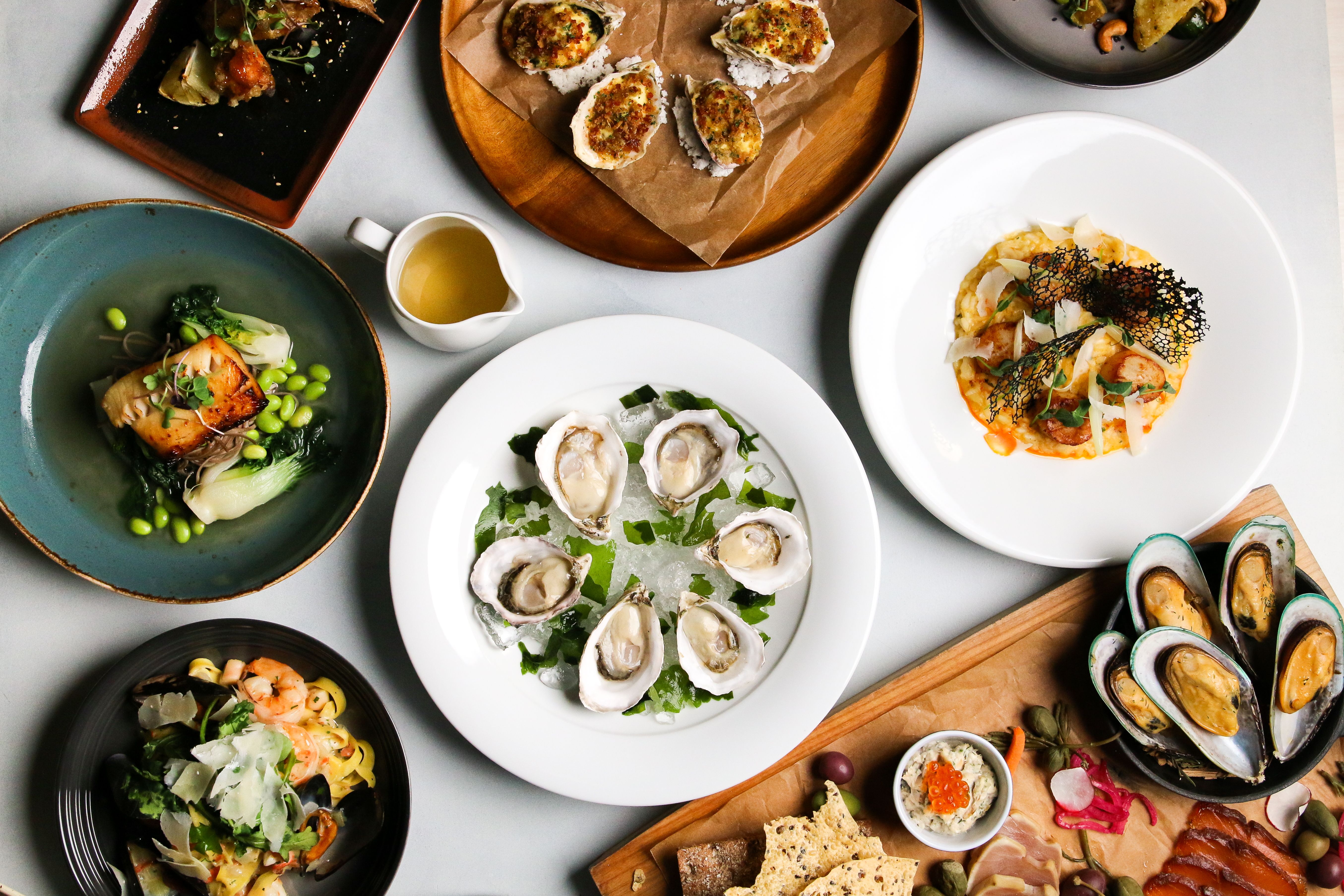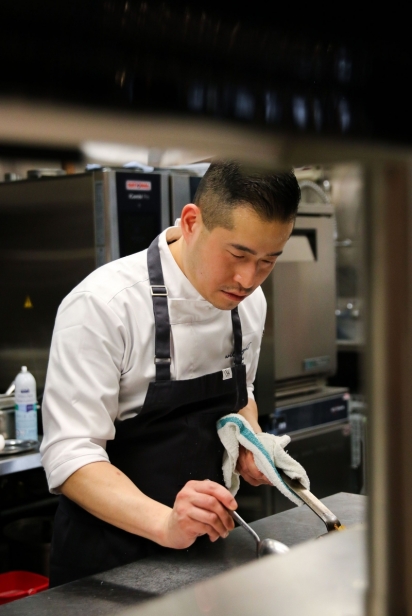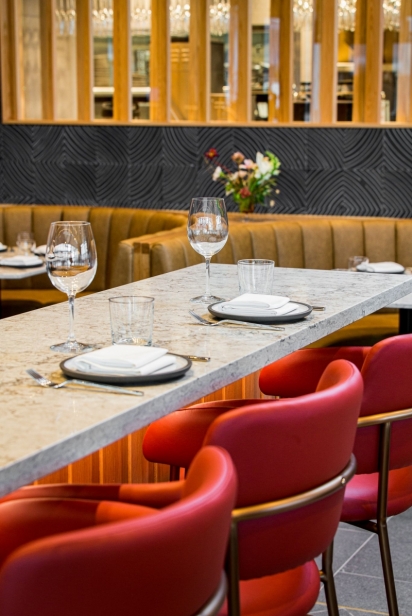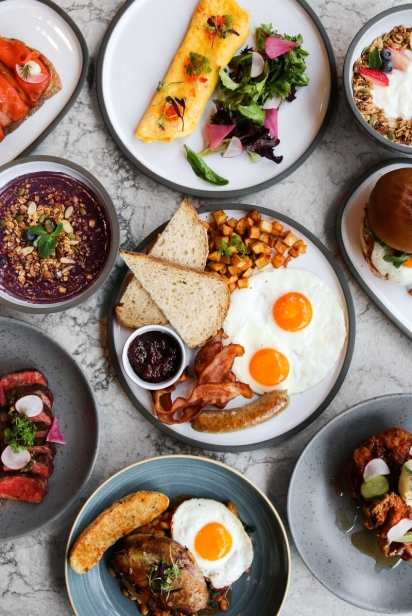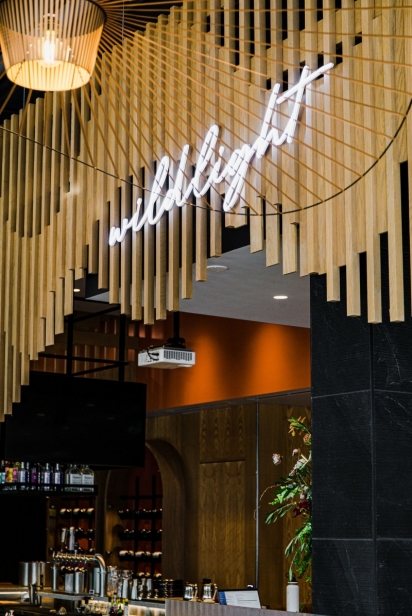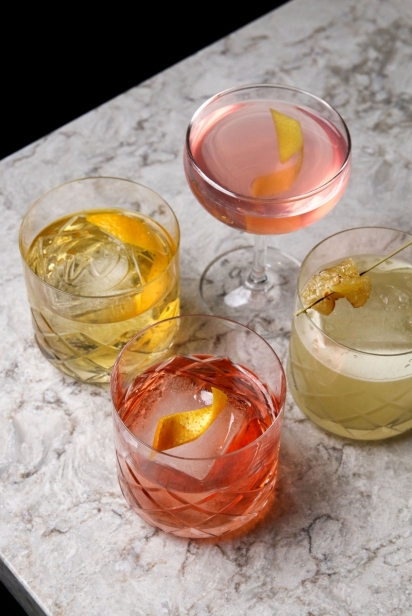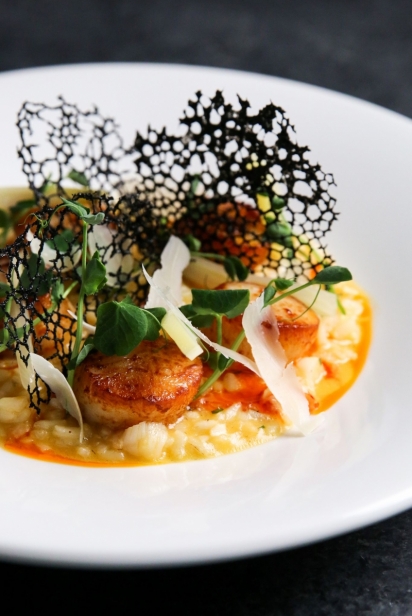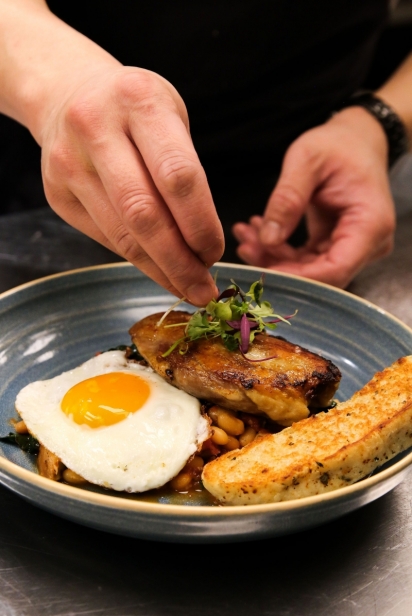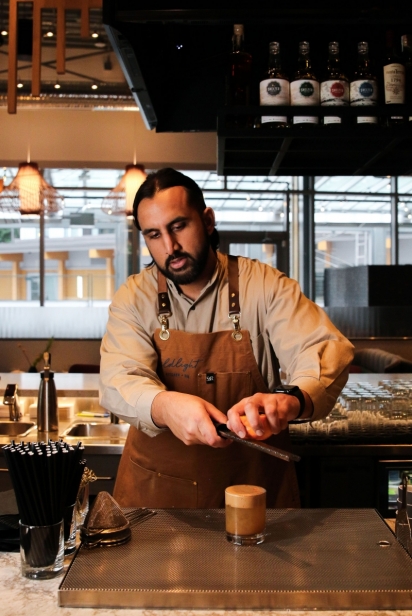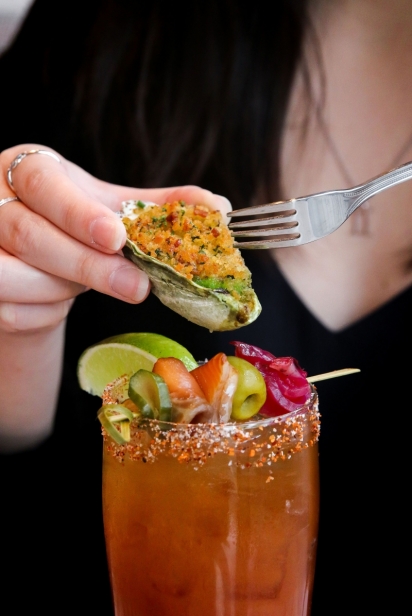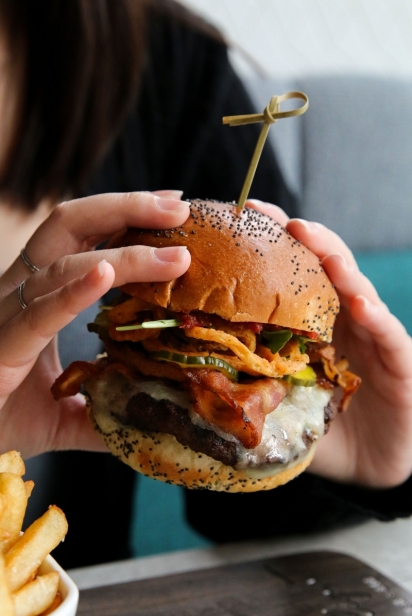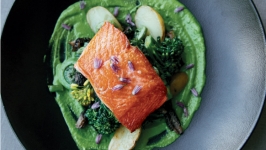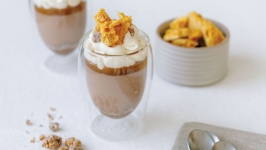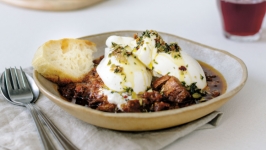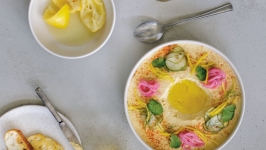Now That is Farm Fresh
So often, ordering salad in a restaurant feels like penance, something you do a little grudgingly to meet your daily nutritional needs, and not because it makes your mouth water with longing. Many salads live up to those low expectations with flavourless greens and boring garnishes, flaccid with dressing that is too tart or too oily or too bitter or too anything but delicious.
But not this salad.
These leafy greens have snap. They are bright, sweet and peppery, lightly kissed with a roasted shallot vinaigrette and deftly partnered with compressed pears, charred grapes, candied walnuts and a flax cracker that, through some sort of culinary wizardry, looks like a piece of stained glass.
What makes this salad so good isn’t just the culinary skill of chef Warren Chow and his team at Wildlight Kitchen + Bar. That helps, but the real key is a secret ingredient called UBC Farm, which also happens to be the restaurant’s neighbour and the source of much of its produce (in season, of course).
“It resonates with us because, one, it’s in our backyard [and] it’s certified organic. It reduces emissions. It ticks all the right boxes,” says Brenton Smith, Wildlight’s general manager. “It was a no-brainer, and it was Warren’s brainchild.”
A renegade farm
UBC Farm is rare, if not unique, in the world of academia. “There are definitely university farms out there, but they are rarely at this scale,” says Pierce Pimiskern, the farm’s sales manager. “And it’s rare to have a site this large on campus.”
Most university farms, he says, are small, at risk of losing their land to development and relatively cut off from the surrounding community. UBC Farm, on the other hand, sprawls across 60 acres (including eight acres of cultivated produce), is protected against development by a “Green Academic” designation and has become a vibrant part of the Vancouver community.
That it exists at all in a city with some of the most expensive real estate on earth is something of a miracle.
As far back as 1911, when UBC’s founders scouted potential sites for the university, having a dedicated teaching farm was always part of the plan. But construction of the Point Grey campus languished for more than a decade, while students were relegated to a handful of inadequate shacks in Fairview. When the university finally opened in 1929, after the famous Great Trek protests shamed the administration for the delays, some 200 acres of campus — that is, most of it — were designated farmland for agronomy, horticulture and animal husbandry, including a dairy farm and poultry plant.
But that all gradually disappeared after the Second World War. As farming became more industrialized and real estate more expensive, agricultural research moved to facilities in the Fraser Valley and on-campus farmland was replaced by athletic fields, parking lots, academic buildings and, eventually, inevitably, housing.
Then, in 1999, students in the new Agroecology and Global Resource Systems programs discovered the seemingly abandoned south campus fields and figured they’d make a great place to grow veggies.
“It was a renegade garden at the time,” Pimiskern says. “It was just students hopping the fence and growing a kind of community garden. Then it grew and grew and grew.”
Unfortunately, the land was already designated for market housing and in real danger of being turned into condos. It took a passionate “Save the Farm” campaign and another great trek to save it. In 2001, the UBC Farm was officially established. In 2011, it was re-zoned “Green Academic” and the Centre for Sustainable Food Systems was founded to pursue research with global reach.
Today, UBC Farm is an integrated organic farm and forest ecosystem. It is an important educational and research facility that cultivates more than 200 varieties of fruits, vegetables and herbs, and is especially known for its strawberries and blueberries. Since the beginning, the farm has offered CSA (community-supported agriculture) boxes of veggies and bouquets of flowers.
More than that, though, UBC Farm is home to both the Indigenous Health Research and Education Garden and the Mayan in Exile Garden, which not only grow traditional crops, but sustain ancestral practices. It also holds three farmers’ markets a week during growing season, a famous plant sale every year, kids’ camps in summer and dozens of events throughout the year.
“Yes, it’s a production farm, but it’s a hub for a lot of things happening at once,” Pimiskern says. “It’s a pretty exciting little farm.”
Enter Wildlight
With all this bounty growing right in the city where the 100-mile diet was invented, it was only a matter of time before Vancouver’s chefs came calling. Today, diners can find UBC Farm produce on the plate at, among others, The Stable House Bistro, L’Abattoir, The Birds & The Beets and Brasserie Coquette.
“We tend to have relationships with the chefs themselves, not the restaurants,” Pimiskern says. Some of the chefs order very specific things; Phil Scarfone at Osteria Savio Volpe likes the padrón peppers that ripen in August, for instance, while Gus Stieffenhofer-Brandson at Published on Main is crazy for May’s underripe strawberries. “I had to pick those special for Gus last spring,” Pimiskern says with a laugh.
Even chefs who don’t regularly use UBC Farm produce have likely worked with it at events and fundraisers such as the one a few years back for Growing Chefs, where chef Warren Chow made a memorable “texture of carrots.” Back then, he was still working at Juniper Restaurant & Bar. Fast forward to 2022, fresh off winning a gold medal at the Culinary World Cup, and Chow has found himself working even more closely with the farm.
That’s because Darrell Jones, president of Pattison Food Group, decided that in addition to its 300 Save-On-Foods, Buy-Low Foods, Quality Foods, Everything Wine and other retail brands, the time was right to open the group’s first restaurant. Perhaps even crazier, he decided to make it a premium restaurant called Wildlight Kitchen + Bar and to set it amid what has traditionally been the culinary wasteland of UBC.
“When Darrell Jones said he wanted to open a restaurant, everyone said, ‘You’re off your rocker.’ But it makes sense. We all love food,” Chow says. “The synergy between the grocery store and the restaurant go hand in hand.”
For Chow, Wildlight Kitchen + Bar is an opportunity to cook the kind of West Coast food he loves best with the security of a supportive company behind him. “I’ve been in restaurants where you are completely on your own,” he says. “We’re really set up for success here. It’s so rare in this industry. I have complete creative control. It’s corporate, but it’s not.”
That means he can create his own menu and choose his own suppliers, as long as they pass the company’s quality control process. And he knew right away who he wanted to work with the most. “I want to develop a really close relationship with UBC Farm,” he says. “When harvest starts in March, I’m going to bring the whole back of house team [to the farm] and get their hands dirty.”
Pimiskern credits Darren Clay, Vancouver president of the Chefs’ Table Society and executive sous-chef at UBC Food Services, for connecting them. “Warren reached out to me at the end of our season and just invited me over to check out the space. It was still under construction, but it was beautiful,” he says. “He has visited the farm in the past, and I’m looking forward to having him and his team out here in the spring.”
‘Everything we want’
“Beautiful” is indeed the word that leaps to mind when you set foot in Wildlight, with its soaring floor-to-ceiling windows, natural wood, stone and marble features, stylish but comfortable furniture and delicately architectural light fixtures floating above the banquettes. This elegant new restaurant, designed by Karen Butler formerly with Maxam Design International, is located in a brand-new development called Lelem Village, a community planned with Musqueam cultural principles and built in an area that was, until recently, just wilderness.
It opened on February 2 and, once it’s fully operational, will be open daily from 11 a.m. to 11 p.m., hoping to catch the university lunchtime crowd, the weekend golfers, visiting parents and dignitaries and students stopping by after class for a happy hour burger and beer. The team is also hoping Wildlight will draw diners from nearby Kitsilano and all over Vancouver. “We want to be a destination restaurant, too,” Chow says.
It’s all a bit shocking (but in a good way) to those of us who attended UBC back when “food” meant whatever you could scrounge up in the grim brutalist bunker of the Student Union Building or the handful of pizza and chow mein joints scattered around campus.
And, as beautiful as the room is, the food is even more exciting. Chow describes it as “very West Coast. It’s premium, but it’s approachable. It’s globally influenced, which is very Vancouver.”
That means lots of seafood, fresh sustainable ingredients, “a full-on B.C. wine list” and craft cocktails like the rich, chocolatey S’more Me More made with marshmallow-infused Odd Society vodka.
Take Chow’s signature pescatarian board, which he describes as “B.C. on a plate.” It features creamy sablefish rillettes, tender albacore tuna tataki kissed with just a hint of smoke, pretty pink beet-cured ling cod, salmon pastrami and plump marinated mussels, as well as crisp housemade rye, nori and papadam crackers. It combines the best local ingredients with tastes from many of the cultures that call British Columbia home.
Then there’s the Fraser Valley duck, which partners seared breast with confit tucked into a crisp potato croquette, served with sweet carrot purée, irresistibly chewy spaetzle, pickled local chanterelles and darkly rich duck jus. Or the celeriac agnolotti, tender pillows of pasta filled with a creamy celery root purée and lavished with a nutty beurre blanc, enhanced with meaty matsutake mushrooms, crisp Brussels sprout leaves and a crunchy brown butter gremolata.
“I love adding texture to my dishes with a crisp or a crumb,” Chow says. “I need that contrast. I’m looking for that crunch, that bite.”
As the weather warms up, more and more of those ingredients will come from the farm just down the road.
UBC Farm has “pretty much everything we want,” Chow says. That includes the basics such as carrots, cucumbers, beets, cauliflower and, of course, the famous strawberries and blueberries, but also rarer finds such as sunflower sprouts, pea shoots and watermelon radish.
“They have sunchokes, they have beautiful elephant garlic. A lot of heirloom vegetables. Everything they grow is beautiful,” Chow says, adding, “When I was creating my order for the restaurant, I gave Pierce my produce list, my herb list, and he said, ‘Yes, we have that, and that, and that.’”
Salad greens are at the top of that list, Pimiskern notes, and even in February the greens were vibrant with herbaceous flavour and just so darn pretty amid the late winter gloom. When produce is this fresh, this varied, this darn good, it’s never a chore to eat your veggies.
Chow knows just how lucky he is. “UBC Farm is very small scale, so for them to partner with us is very exciting,” he says. Pimiskern feels pretty lucky, too, even though he hasn’t dined at Wildlight yet. “I can’t wait to. It’s a beautiful space they’ve created. I’ll be visiting really soon,” he says.
Besides, he adds, “We’re in the same community. We really care about supporting exciting food projects that are so close. Those local relationships — you can’t beat that. It’s so sustainable.”
And delicious, too.
Wildlight Kitchen + Bar
107-5380 University Blvd.,Vancouver
wildlightrestaurant.ca | 604.915.0722 | @wildlightrestaurant


